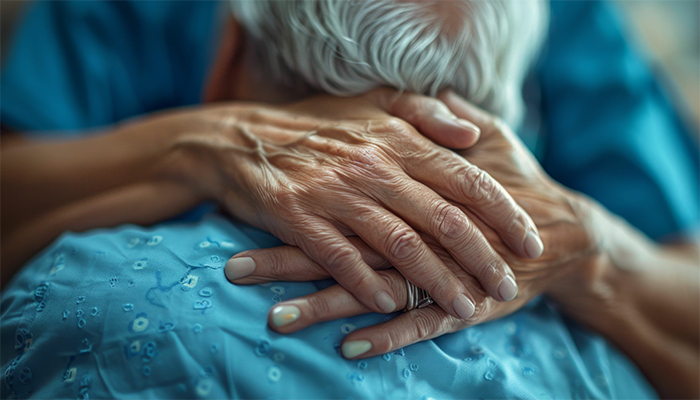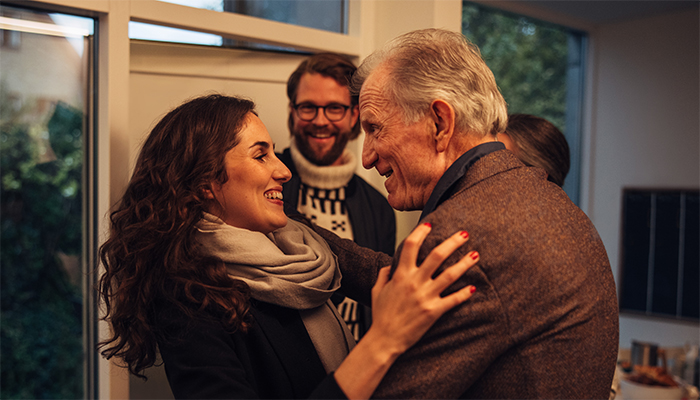Learn more at www.answers4agingbutte.com or www.answers4aginggtf.com
A monthly newsletter
for families caring for an aging loved one
November/December 2024 Print
Touch as a lifeline for elders
 We come into the world with an immediate need for touch—to feel safe and comforted. Touch is described as our “first language,” and it remains essential throughout life. In our elder years, our other senses diminish (sight, hearing, smell, taste), giving touch extra importance. Has widowhood or isolation left your loved one with few options for physical contact? They may be experiencing “touch hunger.”
We come into the world with an immediate need for touch—to feel safe and comforted. Touch is described as our “first language,” and it remains essential throughout life. In our elder years, our other senses diminish (sight, hearing, smell, taste), giving touch extra importance. Has widowhood or isolation left your loved one with few options for physical contact? They may be experiencing “touch hunger.”
The COVID-19 pandemic underscored the crucial importance of touch. Recall the poignant pressing of hands to windowpanes? And the “cuddle curtains” people concocted, adding sleeves to shower curtains so they could safely hug family members.
Touch supports overall health. Research shows that friendly touch releases hormones that reduce stress and anxiety, bolster immunity, improve sleep and mood, and reduce pain. If your loved one has dementia, touch helps reduce depression and angry outbursts. Pets can provide similar benefits. Adding touch therapies and physical contact to your relative’s routine can significantly enhance their overall mental and physical health. (And are you getting enough touch?)
Ways to add gentle touch to your loved one’s life
- Offer a handshake or an arm for support.
- Give a meaningful hug when appropriate.
- Dance together, swing and sway just for the fun of it!
- Apply lotion to hands, arms, and feet. (Consider switching roles to allow them the joy of giving touch as well.)
- If a live-in pet is not an option, consider asking if there’s a pet therapy service in the area. Even robotic pets can offer many of the same benefits.
- Consider professional massage therapy, even just for head and shoulders or legs and feet. Many providers will come to the home.
Permission. Some individuals are not comfortable with spontaneous touch or may feel surprised. When initiating touch, ensure it is welcome by making eye contact, asking permission, and observing body language.
Return to topHoliday dementia visits
Perhaps you are looking forward to visiting relatives this holiday season. If your loved one has dementia, however, consider their condition a “third guest” with very particular needs to be addressed. Here are tips for a smoother visit:
- Leverage environmental support. Pack along your relative’s favorite mug, jacket, stuffed animal, or other comforting items. Also arrange for a quiet space away from the hubbub in case things get too chaotic for your relative.
- Stick to basic routines. Maintain your usual home schedule for sleep, bathing, and medicines. This conserves your loved one’s mental energy.
- Be flexible. If it’s a bad day or your loved one gets overwhelmed, be willing to bow out of event(s) and have quiet time.
- Prepare for disorientation. Put a sign on the bathroom door. Going out, put your name and mobile phone number on a card in their pocket or wallet, with a note about memory loss. Perhaps attach a Bluetooth or GPS tracker to their jacket so a mobile app can locate them if they wander off.
- Be watchful for agitation. If you see signs of edginess, take action to soothe and distract them early. Validate their emotions and move together to a quieter place. Try to identify the trigger. If it’s a sudden, extreme reaction (delusions, hallucinations), consider going to the ER. It could be a sign of a bladder infection or other painful condition.
- Forewarn family before the visit. Let them know what helps (routines, calm touch, quiet space, flexible plans). And not to take outbursts personally. Also, prepare them for what doesn’t help—for example, scolding or reasoning are not appropriate. Your family member will be doing the best they can!
- Reflect afterwards. If you come home enheartened by the trip, great! But if you return feeling tired and despondent, maybe it’s time to get more support.
Age-friendly car features
Older drivers are generally more cautious, but also more vulnerable to injury during a crash. Good news: Keeping your relative safe on the road may be easier than you think. But it could require upgrading to a newer car. Choosing the right car features can improve safety, comfort, and ease of use—and reduce risk for your loved one.
Crash safety first
When assessing a car, review crash-safety ratings first. You can find ratings from the Insurance Institute for Highway Safety (IIHS) at www.iihs.org/ratings or www.SaferCar.gov.
Advanced safety features to consider for common problems of aging
- Looking over the shoulder. Choose a car that’s vintage 2018 or newer, when backup cameras became standard equipment. Parallel parking assistance helps by displaying a video view of the back end of the car. It also can include guiding lines and even alerts when the car is getting too close to an obstacle. Blind-spot monitoring alerts the driver when cars are approaching from the rear yet may not be visible in the mirrors.
- Difficulty seeing at night. Find a car with LED headlights. LED light spreads wider and projects farther than previous light technology. High-beam assistance may help your loved one feel more confident using the bright setting because it automatically changes to regular when it senses an approaching vehicle.
- Arthritis and stiff joints. “Proximity keys” that unlock the car when standing close by remove the need to struggle with fishing out a key to grasp and twist. They also provide for push-button start as well as opening of side doors, hood, and trunk. Heated seats and a heated steering wheel can ease back pain and stiff hands.
Assistive devices. Consult with an occupational therapy/driver rehabilitation specialist before adding nonfactory parts, such as hand controls and steering devices.
If you or your loved one has concerns about whether they should still be driving, get a professional driving assessment.
Return to top
